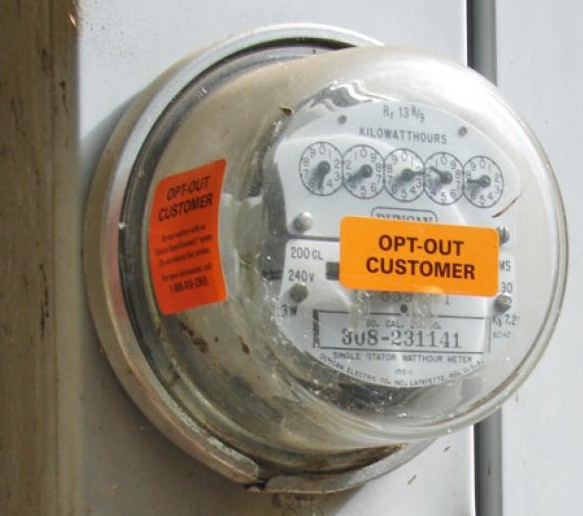By Rebecca Lessner
For MarylandReporter.com
Extra fees for electricity customers who refuse to accept “smart meters” because they are wary of the new technology would be eliminated by a bill heard by the Senate Finance Committee Tuesday, and any extra costs would be spread across all customers.
Utility companies argue these fees are necessary because of the extra cost of continuing to read the old meters.
Customers of the Baltimore Gas and Electric Company (BGE), the Potomac Electric Power Company (Pepco) and Delmarva Power and Light (DPL) have been facing “opt-out” fees that came with their option to choose analog meters over smart meters, a new technology utility companies are pushing to implement fully across the state. Smart meters transmit electricity usage by customer to the companies through two-way radio communication.
The Public Service Commission last year approved fees for the customers “opt-out” choice. There is an initial upfront cost of $75, followed by a monthly charge ranging from $11 to $17.
“The magnitude of these fees will fall disproportionately on some customers, particularly low-income, poor and fixed-income customers,” said Sen. Nathaniel Mcfadden, D-Baltimore City.
“The majority insists that it would be discriminatory to set different rates for low income customers, yet through hoisting additional upfront costs and monthly occurring opt out fees, these customers will surely have the perverse result of adding to their already burdensome cost of living.”
No additional fee for opt-out
Under SB9, a utility company would not be able to impose “any additional fee or charge” on customers who opt-out of smart meters or request the removal of one.
Utilities are using smart meters to keep track of customer electricity usage on a monthly basis. Companies are offering “peak time rebates,” a credit back to a customer’s account for a reduced electricity usage during peak hours. Customers in Pepco and BGE territories have received an estimated peak-time rebate of $17.43 according to Kevin Hughes, chairman of the Public Service Commission (PSC).
However, Sen. Delores Kelley is concerned for those who do not receive the rebate and are instead being charged for their decision to opt-out.
“Right now people who have opted in are not paying one cent in Maryland, which is clearly not right, while those who opt out are paying the entire cost of all meter reading,” Kelley said.
Kelley questioned the PSC on the possibility of spreading costs appropriately, based on the type of system individuals choose to use, instead of focusing costs only on those who have analog readers.
The PSC is waiting for opt-out customers to stabilize. Once the PSC receives enough data to determine the effectiveness of smart meters they will re-evaluate “an appropriate cost” and use discretion in any additional costs imposed on those opting out.
“I think the commission has really bent over backwards to get these fees as low as we can and still adhere to our principles of cost causation,” said Hughes.
The usage on old style meters must be recorded by a person looking at the dials on the meter.
Sen. Kelley asked to have a statement on record regarding PSC’s promise to re-evaluate spreading costs based on the effectiveness of smart meters.
“Yes, we certainly would look at the whole structure of cost recovery for all meters if that were the case,” Hughes replied.
Privacy and radio waves
In addition to privacy concerns of the data collection, consumers are choosing to opt-out of smart meters due to uncertainty in the effect of additional radio waves in homes.
“The utilities have conducted no research whatsoever on the health impacts of smart meter radiation,” said Dr. Anita Moore, a veterinarian in Anne Arundel County.
Moore was among a panel of individuals in favor of SB 9, and believes the radio waves generated by smart meters, when added to waves already being transmitted by household appliances, would have negative effects on health.
SB 9 would require PSC to join with the Department of Health and Mental Hygiene (DHMH) in the creating a report that analyzes “health effects of smart meters in the state…radio frequency levels…and evidence-based recommendations relating to the potential health effects of smart meters,” said the bill’s fiscal note.
However, the PSC and DHMH believe this information will only be effective if collected on a federal level, and they feel a state government’s findings would be too inconclusive to be trustworthy.
RebeccaAnnLessner@gmail.com






At least 10 years ago, most, if not all “manual” meters were replaced with “transponder” meters. These work like EZ-Pass transponders except your meter is stationary and is read and recorded automatically by a BGE employee driving by your house in a car equipped with a reader and recorder. Sure, it costs a little more for cars, gas and salaries, but the “opt-out” fees are FAR in excess of these costs.
I don’t know about the rest of you, but I did not allow a smart meter to be installed in my house – I still have an “old style” meter, AND my electric meter is most definitely NOT read by “a person looking at the dials on the meter.” My meter is inside my house, so there is no way possible for someone look at the dials unless I let them in my house, which I haven’t done. So if my meter isn’t being read by a person looking at the dials (and I’m assuming my meter is not the only one in Baltimore), then why the need to charge for additional man-power to read dials on meters?
You have a transponder meter, most likely. That can be read by an elec. co. employee with the appropriate reader/recorder, from a car outside your house–no need to bother you at all.
Finally – legislators are seeing the need to legislatively constrain both the Utilities and the PSC for their miserable failures to protect not only ratepayer interests, but human health and privacy. Four points to expand on here, so readers have the full truth: 1) On the claim of ‘extra cost to continue to read old meters’. It is laughable that the utilities continue making this claim, and the average person blindly accepts it. You cannot and do not have ‘extra’ costs, for something that is already occurring. The introduction of smart meters did NOT cause ‘extra’ costs all of a sudden, for something they have been doing for years! This is disingenuous at best. Even from a bottom-line accounting standpoint, when you put the SAVINGS incurred (from the absence of meter reading costs attributed to smart meter homes) on one side of the ledger – versus the CONTINUED/EXISTING costs attributed to a PALTRY few homes with analogs – the NET PROFIT will blow away any ‘whining’ the utilities shamefully put forth! Furthermore – have the utilities YET offered to reduce the $7.50 ‘customer charge’ that is STILL on the back of the bills going to smart-metered homes? Answer: NO! Therefore, they are DOUBLE-DIPPING folks! C’mon – they are selling Brooklyn Bridges by the minute here. People need to quit BUYING them! 2) On the notion ‘once the PSC receives enough data to determine effectiveness of smart meters’: Hello PSC? Are you not the organization that is supposed to VET such things? Your position is self-incriminating. You confirm your own failure by saying you are waiting on receipt of such info! 3) PSC Commissioner Hughes says they ‘bent over backwards to get the fees low’. Please tell us how you think that by accepting a FACTLESS ‘snapshot’ of costs from the utilities, for use in determining fees, constitutes bending over backwards? If THAT is your idea of oversight for ratepayers, help me Lord – you ALL need to be replaced. (Governor Hogan – please listen up?) 4) This one is truly rich. Both the PSC and the DHMH conclude that creating a report on the health effects of smart meters will be ‘too inconclusive to be trustworthy’. THANK YOU BOTH for making our own argument and point all along!… that smart meters never should have been installed in the FIRST place – until such time as their safety is PROVEN! You guys just ADMITTED there isn’t enough information to PROVE their safety! After doing so – HOW can you continue to justify proceeding with an unproven device ? Let us all now put our helmets on please to protect our heads – because we truly must bang them against the wall on THAT one. In closing – a huge thanks to Senator McFadden for picking up the gauntlet here for ratepayers and humankind in the great ‘free’ state of Maryland.
Really…….what a waste of time……………..We save on costs in our Co-op through the use of these meters……………..leave this alone!
to Michael: Huh? So everyone else but you should ‘go pound sand’ ?
We. as far as I can determine I don’t believe I told anyone to “go pound sand” but if you like such activities then. by all means. pound on………………….or perhaps a reading comprehension course at a local CC is in order…………………….and for those who believe eliminating the use if these meters would provide more privacy I find that argument religious (HOLY, as in full of holes) in that the way the smart meters I have work there are no humans prowling my grounds trying to read my meter or collecting info on what I use power wise……but perhaps I simplify the matter too much…………..perhaps there are those amoung us (who don aluminum foil caps and are ardently against any data being collected by anyone…………………………………………………..am thinking that it may be time to change my name to “In Choptank I Trust”………………..or maybe “Chaptank Don’t Scare Me At All”……………………..
How quickly we dig in and assail, from both sides.
An issue highlighted is the forced choice, one that is close to, or on the homes. Maybe this is analogous to the incandescent/halogen vs CFL vs LED
bulbs. We have the choice to outfit our home as we see fit, whether due
to bulb cost, energy use, or indifference.
Further concern is expressed over privacy, health, and business practice/approach. At face value this appears as a fight to resist progress or technology. Do we pause to consider if the progress really is progress, or the
technology is the best approach, or a beneficial approach? “Smart”
meters may introduce privacy, or future privacy issues. High frequency
RF may erode our health. Meters may save a salary and truck expenses. Who paid for the meter readers or truck before? Who pays to purchase and upgrade the meters? What are the business benefits? Are the cost savings being returned as a credit?
I made these comments a year ago and you are just now commenting? Really? Looks to me like something has eroded for sure……
WOW! I can swelter in the summer heat and get a whole $17.45 for it! Who knew?
Detect a note of sarcasm? ALL the benefit of these meters goes to Utilites. Cost savings, were mentioned over and over again by utility executives suring the hearing. Cost savings for THEM! WHEN are they going to pass these cost savings on to customers? BGE has raised rates 4 times in 4 years. The PSC is allowing utilities to charge us upfront with none of the ususally required justifications. You did not mention the FIRES caused by smart meters. They are real and will continue to happen.
You neglect to add a few more to the list of those that promised to lower utility rates, our politicians in Annapolis. The hype of savings never seems to live up to reality yet voters kept putting these people back into office again & again.